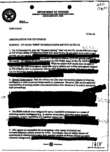Newspaper theft
Newspaper theft is a form of censorship in which a large portion of the print run of a newspaper or other publication is stolen or destroyed, with the intention of preventing others from reading it. It may be carried out by individuals, organized groups, or governmental entities.
Overview
The motivation for newspaper theft is usually to suppress circulation of a story, item, or advertisement that is viewed as unfavorable or offensive by an individual or group. In some cases, the action is motivated by a generalized animus toward the editorial slant of the publication. The actors involved in newspaper thefts vary; they include political groups, fraternities and sororities, college athletic teams, as well as politicians or public officials, who may order police or other government agents to remove copies the publication.[1][2]
The Student Press Law Center has tracked college newspaper thefts since 2000.[3] In 2012, 27 newspaper thefts were reported by college papers.[3]
Laws concerning newspaper theft
The unpaid taking of newspapers which are for sale constitutes theft, however removal of multiple copies of free newspapers and publications is not a crime in most jurisdictions. In response to high-profile incidents, laws specifically against newspaper theft, including the theft of large numbers of free newspapers, have been passed in the states of Maryland and Colorado, and the cities of San Francisco and Berkeley, California.[4] The Maryland law makes it a misdemeanor offense when "A person ... knowingly or willfully obtain[s] or exert[s] control that is unauthorized over newspapers with the intent to prevent another from reading the newspapers."[5]
Purchase with the intent to block distribution
A related and less common phenomenon is the clandestine purchase of a large portion of the print run of a newspaper. While this does not normally violate any law, the United States Court of Appeals for the Third Circuit ruled in the 2004 case Rossignol v. Voorhaar that public officials who purchase a large portion of the print run of a newspaper with the intention of keeping a story out of the view of the public are acting in violation of the First Amendment and are liable for civil damages. This decision was later upheld by Supreme Court without hearing.[4]
In popular culture
In the film Absence of Malice, the character Teresa Peron attempts unsuccessfully to destroy a run of newspapers that has a story exposing her abortion, before she commits suicide. In an episode of King of the Hill, Hank removes an embarrassing photograph from all his neighbor's local newspapers before they woke up that morning.
References
- ↑ Hiestand, Mike (2005-03-01). "Newspaper theft remains popular form of censorship". Trends in College Media. Retrieved 2010-07-12.
- ↑ Thornton, Paul (2002-12-12). "Berkeley Mayor Tom Bates to Plead Guilty to Theft". The Daily Californian. Retrieved 2010-07-12.
- 1 2 Where newspaper thefts are reported
- 1 2 Calvert, Clay (2005). "All the News That's Fit to Steal: The First Amendment, a Free Press &(and) a Lagging Legislative Response" (PDF). Loyola of Los Angeles Entertainment Law Review. 25 (1): 117–153.
- ↑ Md. CRIMINAL LAW Code Ann. § 7-106 (2006)
Further reading
- Hentoff, Nat. (1993-08-04). "Newspaper theft is latest form of campus censorship". St. Petersburg Times.
- Scherr, Judith (2008-05-29). "Newspaper Theft Increases, New Law in the Works". Berkeley Daily Planet.
External links
- Newspaper Theft Checklist, Student Press Law Center
- Newspaper Theft Forum, Student Press Law Center
